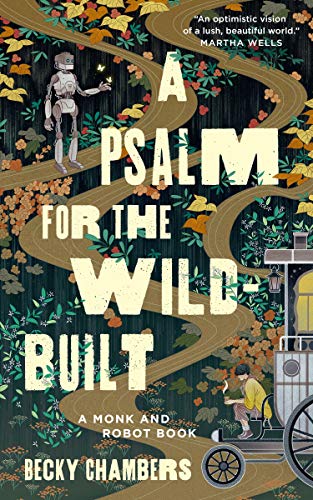Summary and review: A Psalm for the Wild-Built by Becky Chambers

Book Review | Synopsis | Similar Books | Excerpt | Buy It
“Old people, young people. Everybody needed a cup of tea sometimes. Just an hour or two to sit and do something nice, and then they could get back to whatever it was.”
A Psalm for the Wild-Built
Book review of A Psalm for the Wild-Built
This book opens with a dedication to anyone who could do with a break. Dang, does this book deliver.
The first book in Becky Chamber’s Monk and Robot series, A Psalm for the Wild-Built is one of the most popular books at the forefront of hopepunk, a genre of optimistic and utopian sci-fi that’s grounded in human kindness, sustainability, and care for nature.
The result is a true balm for the soul, as comforting and wholesome as any of the personalized tea blends conjured and served with love by Dex, a tea monk at the centre of this story.
At the heart of the book are these questions: What do humans really want? What does a meaningful life look like? And what about meaningful work?
In this heartwarming story, we enter a utopian future years after the end of the Factory Age, when robots put down their tools and gave up their roles as human servants to disappear into the untouched wilderness. That’s where they’ve remained, far from human life… until a robot suddenly turns up at a tea monk’s door.
This book got me thinking more about my work and how I live than most other books I’ve read in the last year, which, considering how much I read, is saying something.
Is A Psalm for the Wild-Built worth a read?
There’s something so therapeutic about Becky Chambers’ writing. As well as anyone who wants a break, A Psalm for the Wild-Built is the perfect book for anyone feeling lost, directionless, or in need of a big change in life. It’s also full of slice-of-life vibes, if you love that in your reading material.
Synopsis of A Psalm for the Wild-Built
“If we want change, or good fortune, or solace, we have to create it for ourselves.”
A Psalm for the Wild-Built
In A Psalm for the Wild-Built, we enter a utopian future years after the end of the Factory Age, when robots put down their tools and gave up their roles as human servants to disappear into the untouched wilderness. That’s where they’ve remained, far from human life.
In Panga’s main city, we meet Sibling Dex: a non-binary twenty-nine-year-old gardener who has no idea what they want to do with their life. But they do know one thing for sure, that despite the beauty and livability of a metropolis, “sometimes, a person reaches a point in their life when it becomes absolutely essential to get the fuck out of the city”.
And so Sibling Dex leaves their job to become a tea monk, skipping the usual apprenticeship route and opting to learn everything themselves. After a rocky start, Sibling Dex is adored by their customers. Dex listens to their problems, and then serves the perfect cup of tea.
Despite becoming perhaps the best tea monk in Panga, Sibling Dex still feels that this isn’t it. There’s something missing in life. They yearn for wildness and the sound of crickets. And so they cycle their wagon further into the wilderness than definitely advised and take in the freedom and beauty of their new surroundings.
That is, until they’re interrupted by a robot, Mosscap, who has left the wilderness to ask one simple question. What do humans want?It turns out that this is actually an incredibly difficult question, and Dex feels like they absolutely cannot answer it.
What follows is a heartwarming and soul-searching journey of adventure deep into the wild to reach an abandoned hermitage. It’s here that Dex and Mosscap find a deeper bond than they could have imagined, learning more about each other, themselves, and what really leads to a meaningful life than ever would have been possible alone.
An in-depth summary of A Psalm for the Wild-Built (spoilers!)
Books like A Psalm for the Wild-Built
Although there’s sure to be a flurry of Becky Chambers-inspired writers in the next few years, no one really writes quite like she does.
For more books like A Psalm for the Wild-Built, you can’t go wrong with other books by Becky Chambers. The sequel, A Prayer for the Crown Shy, was published in 2022 and is perfect to read next.
You can also escape into Becky Chamber’s Wayfarers series, beginning with The Long Way to a Small, Angry Planet.
Book excerpt
Read the first pages of A Psalm for the Wild-Built, or see the book on Amazon.
Enjoy more from me
- Retreat into my new book, Your Life in Bloom: Finding Your Path and Your Courage, Grounded in the Wisdom of Nature.
- I'm also the author of Mountain Song: A Journey to Finding Quiet in the Swiss Alps, a book about my time living alone by the mountains.
- If you love books, are feeling a little lost right now, and would love some gentle comfort and guidance, join The Sanctuary, my seven-day course to rebalance your life.

